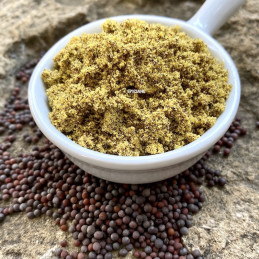
Reference: EPI2301007



Offered in whole seeds or powder.
Its taste is distinctly "mustardy," with a sharp pungency and a hint of bitterness.
It is widely used in Indian cuisine, sauces, meats, pickles, and is also ideal for making mustard.
 Delivery
Delivery
Mondial Relay
 Returns
Returns
See conditions
 Payments
Payments
100% secure
- Livré en sachet refermable -
Pour info, 200g de graines de moutarde ont un volume de 25cl (1/4 de litre) environ.
Ingredients:
Finely grind the seeds (or choose mustard powder), then use a whisk to mix the powder with white wine, vinegar, and salt. After a few minutes, as the mixture thickens, pour it into a glass jar and let it rest in a cool place for a few days. Your mustard is ready!
You can flavor it to your taste by adding tarragon, honey, etc.
These small seeds, about 2-3mm in diameter and ranging in color from reddish-brown to dark purple, are essential in the making of the world’s most popular condiment. The powder obtained from grinding them is slightly pungent, with a strong "mustardy" taste and a hint of bitterness, and has a greenish color. Black and yellow mustard combined are used in the making of Dijon and English mustard.
It's said that the darker the seeds, the stronger the mustard, which is certainly true as black mustard seeds have a much stronger flavor than yellow mustard. Personally, if you want to make your own mustard, I suggest mixing equal parts black and yellow mustard. The black provides strength and bitterness, while the yellow softens the blend to achieve the taste of our "traditional" mustard. For this purpose, you can crush the seeds or use pre-ground mustard powder, adding vinegar mixed with a bit of water. If you use crushed whole seeds, add the liquid gradually over time, allowing the crushed mustard seeds to absorb it without overwhelming the mixture. You can then flavor your mustard with herbs of your choice, or even flowers (lavender is surprising here if carefully dosed!), honey, or anything your imagination suggests.
Black mustard seeds are also commonly used in Indian cuisine for curries, garam masala, and many other spice blends. They flavor pickles, and like yellow mustard seeds, can be added to sauces, meats, and even fish dishes, always at the start of cooking, so the seeds—hard at first—can swell in the juices, soften, and release their aroma during cooking.
In Asian and Indian cuisines, the plant’s stalks and leaves, with their mild flavor, are also used as vegetables, typically sautéed or in salads.
Finally, you can sprout the seeds, producing crunchy, juicy sprouts that are delicious in salads or sandwiches.
Origin: India
Scientific name: Brassica nigra
Other names: Chinese mustard, Sarepta mustard, Indian mustard, senvy, yellow mustard
Black mustard is a biennial plant of the Brassicaceae family, cultivated for its seeds, which are used to make condiments. It grows up to 40 cm, sometimes exceeding 1.5 meters in flowering, with a sprawling or upright habit depending on the variety, and has tuberous roots similar to parsnips. The flowers are small yellow clusters at the top.
Native to central and eastern Asia, it was in China that many varieties were developed. It is now cultivated in Europe, Japan, and North America, with Canada being the leading global exporter.
The plant is also highly beneficial as a cover crop, as its roots loosen compact soils, promoting the growth of subsequent plants. Moreover, it disrupts the cycle of certain cereal diseases and the spread of pests affecting sugar beets.
The term "mustard" appeared in French in the early 12th century, derived from "must," referring to the practice at that time of grinding mustard seeds with grape must to tone down their sharpness.
Known since antiquity, used as a condiment in place of pepper (which was much more expensive), mustard dates back to Sumerian times. Some even believe that our prehistoric ancestors chewed mustard seeds with meat, perhaps to mask unpleasant flavors when the meat was slightly spoiled!
Data sheet
 Anne Marie P.
Anne Marie P.
Bien
 Jean-Philippe L.
Jean-Philippe L.
RAS
 Michèle M.
Michèle M.
utilisée pour cataplasme, très satisfaite de ce produit.

 Anne Marie P.
Anne Marie P.
Bien
 Jean-Philippe L.
Jean-Philippe L.
RAS
 Michèle M.
Michèle M.
utilisée pour cataplasme, très satisfaite de ce produit.

Reference: EPI2301007
Reference: 208037909
Reference: poivrecitronne
Reference: Harissa
Reference: badianeE
Reference: 3N7201902
Reference: 3N7153402
Reference: badianeM
Reference: 00033929-0001
Reference: 20211003
Reference: 20721302
Reference: coriandreE
Reference: 208033101
Reference: 3N7153402
Reference: 1N6987004
Reference: 00723801
Reference: 00029083-0001
Reference: EPI2301001
Reference: 10N7738802

Offered in whole seeds or powder.
Its taste is distinctly "mustardy," with a sharp pungency and a hint of bitterness.
It is widely used in Indian cuisine, sauces, meats, pickles, and is also ideal for making mustard.